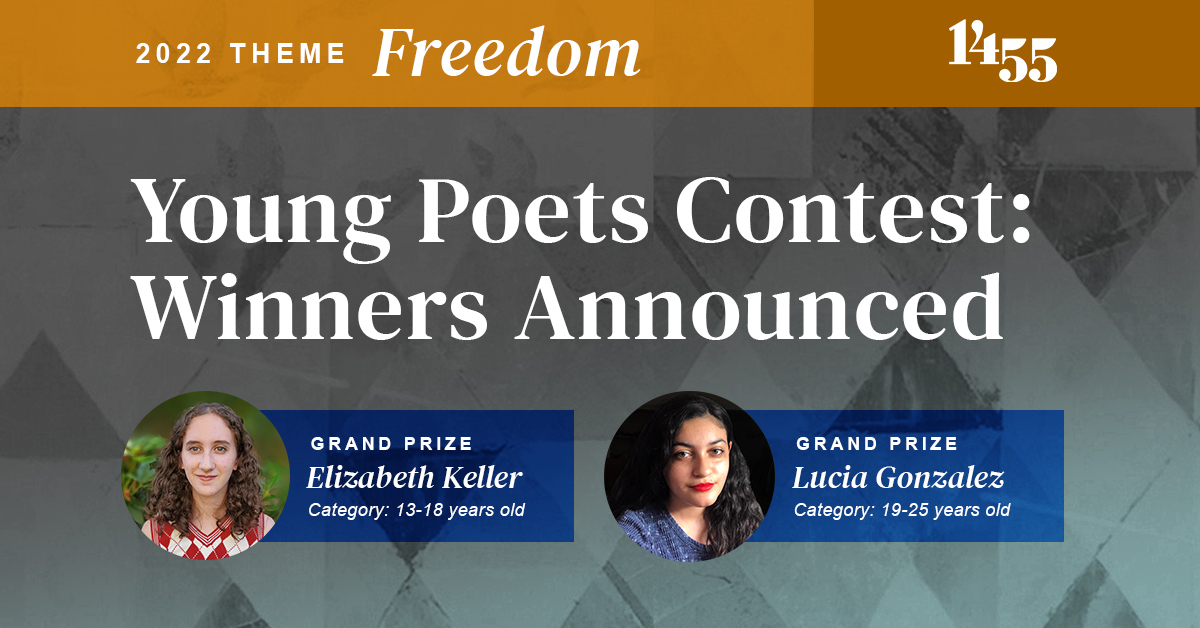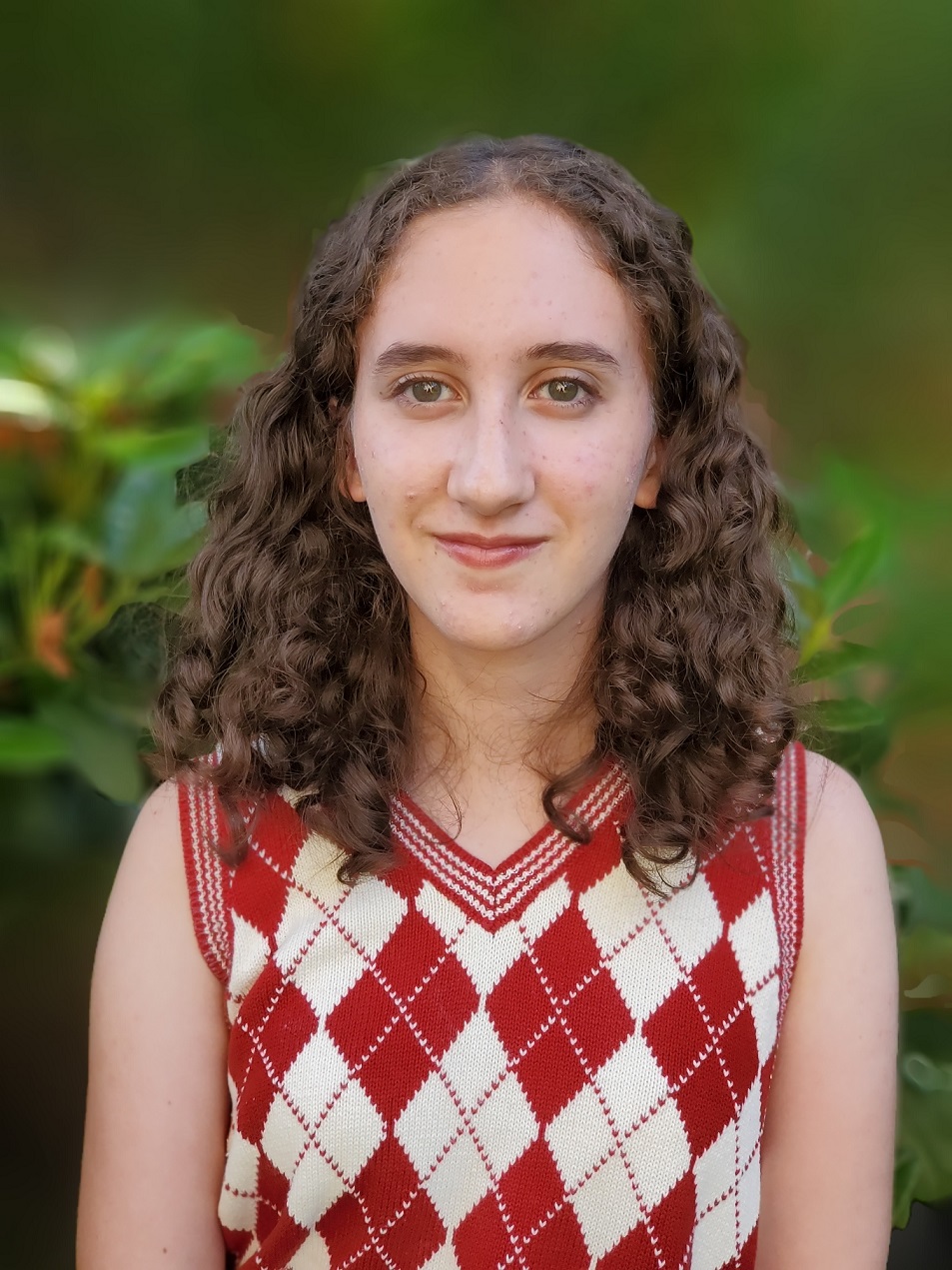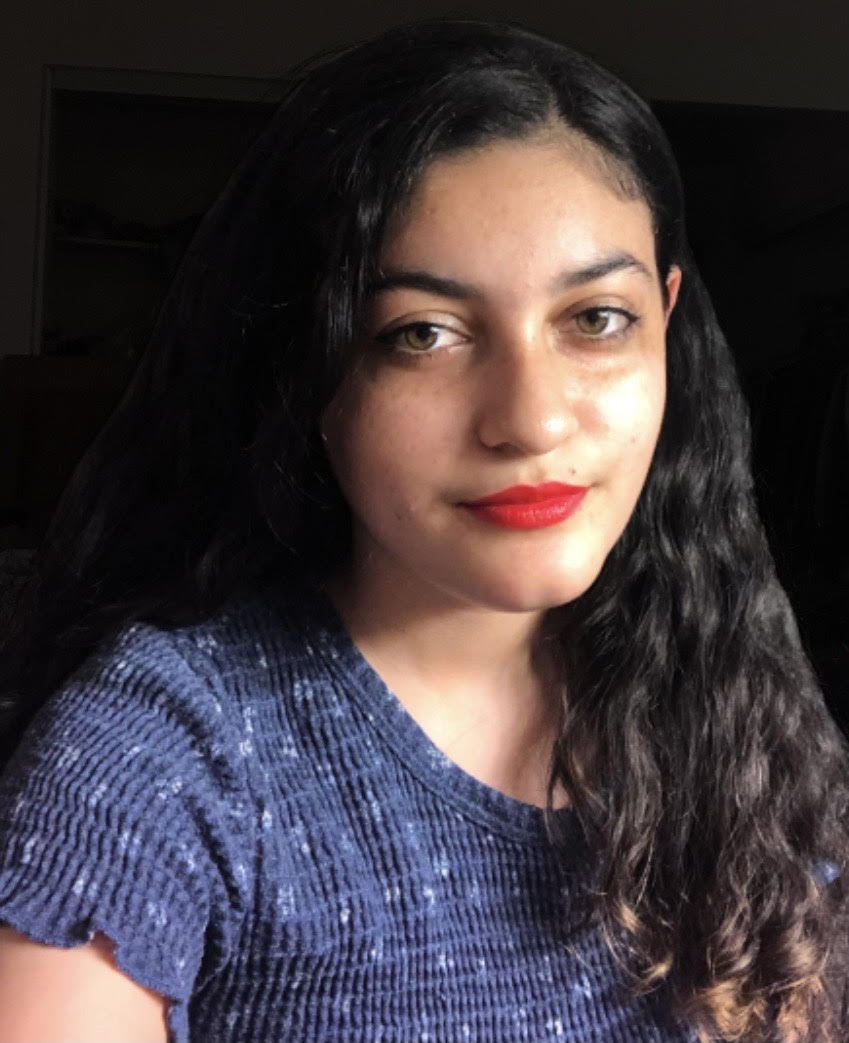
We are pleased to announce the winners of the Fourth Annual 1455 Young Poets Contest. The theme for this year’s contest is Freedom, and the guidelines requested the poems to reflect on or react to the contemporary sociopolitical and cultural environment (including but not limited to #BLM, #MeToo, COVID, etc.)
Once again, we received an astonishing variety of poems, and as was the case in previous years, the overall quality of the writing exceeded all expectations. On one hand, this made for some difficult decisions; on the other hand, based on this sample of young writers, the future of poetry will be diverse, passionate, and brilliant.
The judges (1455 Founder and Executive Director Sean Murphy, and co-judge Maia Siegel) admired the range of voices and quality of expression, but—like previous years!—some excruciating choices had to be made. As such, it was with no small relief that we had consensus regarding the ultimate finalists.
GRAND PRIZE WINNERS
$1,000 Award per poet
Category One: Ages 13-18

Elizabeth Keller
Elizabeth Keller is a senior at Interlochen Arts Academy and is from Vancouver, Washington. Her short stories and poetry have been published in Crashtest and The Interlochen Review. In her free time, she enjoys bad jokes, hugging her cats, and trying to learn to play the pennywhistle.
It’s 2020 and I See Henry David Thoreau at a Fair-Trade Coffee Shop
With quotes from Walden
I hate being alone. It’s one of the first things
all my friends said they noticed: that there’s a lot
of not-me in my head and its fingernails are far too sharp
for any of our good. It’s June and the lockdowns
are lifted though it’s still only my room I feel safe
in. The lightheaded burn of Clorox wipes settles
something in my chest, but I like the smell of matcha lattes
more. I head over to Walden, the only coffee shop
with curbside pickup. I see him there. He’s become
almost a regular. Because of the name, I think. Maybe
when you’ve found a time machine in the woods
or some crazy shit like that the difference between
coffee grinders and steel cookstoves blurs enough
for both to feel like home. I skimmed Walden, the book,
to pass freshman year English. I used to admire
isolation like that. Making everything, even the fingernails,
disappear. Now that I’ve lived it, I’m not so sure. I notice
that Thoreau’s wearing a mask, but it’s woven roughly
out of cattail stalks. He gets his coffee and steps out
into the plaza, arms waving, eyes the simple pinpricks
of a flea. We’re all living and dying, and buried! he shouts.
Talk of the divinity of man! He mumbles something else
about the bravery of muskrats but I can’t quite make out
his point. Now I notice that he’s standing in the middle
of a circle of five spaced-out picnic tables. He’s a preacher
in this church full of pigeon poop and cheap plastic cups
and thirty year old men in flannel jackets, rolled eyes hidden
behind the thick foam of face shields. Everyone’s so far
away. One of the men laughs and points his phone
at Thoreau. This is a charity that hides a multitude of sins,
Thoreau mumbles, confused. Another man chuckles
and does the same. I watch as the flea’s wings
get plucked off slowly, one by one. His cattail mask slips
down his chin. His coffee—cold brew—splatters
onto the concrete. I step forward into the circle, shooting
apologetic looks at the men. I know I’m far too close. I reach
out a hand to Thoreau. His own hands look muddy
with streaks of white. I wonder if he was digging around
in the pigeon poop. I want him to hold me. From the way
the mud hasn’t fully dried I know his hands are warm
and soft. I would let him use my shower. He would whisper
words into my skin: simplicity, cattail. Henry, I say. Come
with me. He doesn’t take my hand. He’s puddled on the ground
and I wonder if fleas have blood. From the desperate city
you go into the desperate country, he says. I want to ask him
how he did it. I don’t. Instead I haul him up by his collar and face
the crowd. The light reflecting through the coffee cups
makes everyone beautiful and the fingernails have become
a good kind of pain. I leave him, standing confused in his cold brew
covered coat, as I walk back to my apartment. I dial
my friends. As the phone rings I find my old copy of Walden
and stuff a page in my mouth, savoring the earthy taste
of the ink as it dissolves on my tongue.
Category two: 19-25 years old

Lucia Gonzalez
Lucia Gonzalez was proudly born and raised in the city of Santa Ana, CA. Their work centers around their experience as a first-generation Chicana, and often features their hardworking father. Two of their poems have been featured in La Vida, the University of Pennsylvania’s Latinx student magazine. Age: 20
& para nuestros papás
After Sarah Kay & Hanif Abdurraqib & Frank O’Hara
Dedicado a todas las personas que hicieron el viaje al norte, y a las que no alcanzaron.
it is father’s day & my father parks his pick-up truck at our apartment & says my grandfather has died (i mean to say my father’s father has died) & my father does not attend his father’s funeral & i now know why my dad has no religion, because sometimes god has too many families to take care of & my father’s father left his family for another woman & had a son who went to college & i am at the airport flying off to college because my father left his family for another country in the back of a pick-up truck on the way to an airport & i am five years old & my mother (i mean to say my father’s ex-wife) asks me if i know whether my dad has another family y le pregunto si tiene una novia & for years i mistake novia for wife & god was always my mother’s excuse for her mistakes & i am in high school telling colleges that my mother considers me her worst mistake & for years i mistake abuse for anger, so my dad drives me in his pick-up truck to our new apartment for the first time & for the first time, i realize i am the only family my father has ever known & i am at a college across the country and for the first time, i am away from the only family i have ever known & my cousin has just told me that our grandfather has died (i mean to say my mother’s father has died) & i now know why my grandmother is so religious (i mean to say my mother’s mother is so religious) because Jesús was once the name of the man she fell in love with & my mother does not attend her father’s funeral & i am at an airport pointed home & my father and i are on the 405 on the way home from the airport & he asks me if i’m hungry but i hear him say, “mija, i know what it is like to have a stomach filled only with your aspirations for tomorrow” & he shows me a picture of the morning sun painting herself across the sky at the airport construction site & i ask him if he’s read about the pick-up truck that crashed at the border
& we sit in silence
& we wonder, how many fathers won’t return to their families…
Runner-Up Spotlight
Category One: Ages 13-18
2ND PLACE PRIZE
Samantha Hsiung
for her poem “home: gone, history: lost.”
—
3RD PLACE PRIZE
Due to the overall quality and difficulty making a definitive choice, we also are awarding two third place awards in this category.
Sophia Liu
for her poem “Elegy to the Motherland”
Dilinna Ugochukwu
for “Poem About Boys Who Died Before They Were Born.”
—
Category Two: Ages 19-25
2ND PLACE PRIZE
Annalisa Hansford
for the poem “when a cis person asks me if trans people are birthed from tenderness or violence, i tell them.”
—
HONORABLE MENTIONS
Shnayjaah Jeanty
for the poem “in which charles Darwin actually heals the black community”
Myesha Phukan
for the poem “alternate names for unmarried married indian women”
—
What’s Next?
All finalists will be invited to read from their work during a special ceremony this Friday at 7pm EST during 1455’s 4th Annual Summer Festival. Also, be sure to follow @1455litarts and on social media to stay up to date on Movable Type’s upcoming issue, which will feature the young poets contest award winners. Subscribe to Movable Type here.

